
When a pet is unwell or injured, it can be one of the most stressful times for any pet owner. In many cases, especially in growing urban hubs like Doha, soft tissue surgery becomes a vital part of veterinary care, serving as an integral aspect of veterinary medicine by addressing a broad range of health issues and improving animal well-being. Whether it’s a routine procedure like spaying and neutering or a more complex surgery to remove tumours or treat internal injuries, soft tissue surgeries play a critical role in restoring your pet’s health, comfort, and quality of life.
This comprehensive guide is designed to help pet owners in Doha understand what soft tissue surgery involves, clarifying that these procedures are distinct from bone-related or orthopaedic surgeries and instead focus on organs, skin, and other soft tissues. There is a wide array of soft tissue surgeries available for pets, covering everything from ear, nose, and throat procedures to gastrointestinal and oncological surgeries. Maintaining safety and comfort during these surgeries is an essential component of pet care. High care standards are followed throughout soft tissue surgeries to ensure the safety, comfort, and pain management of your pet before, during, and after the procedure, and to help you choose the right veterinary care.
Soft tissue surgery refers to any surgical procedure that does not involve bones or joints (also known as non-joint surgery non joint). It encompasses a wide range of surgeries targeting internal organs, skin, muscles, soft tissues, and other structures that are not supported by bone. These procedures can be both elective (such as sterilisation) or medically necessary (such as removing a foreign object or tumour). Veterinary soft tissue surgery is a key area of veterinary practice, addressing a variety of conditions affecting pets.
Common areas covered include the digestive system, respiratory tract, urogenital system, skin, ears, ear canal, cardiothoracic region, and gastrointestinal tract. Common soft tissue surgeries are frequently performed in veterinary medicine; soft tissue surgeries include spay and neuter, hernia repairs, mass removals, and more advanced procedures like cystotomy and splenectomy. Common procedures in veterinary soft tissue surgery address a wide range of conditions to improve pet health and quality of life.

One of the most routine soft tissue surgeries, spaying (female) and neutering (male) (commonly referred to as spay procedures and neuter procedures) are critical for pet population control and also help prevent various health and behavioural issues. These procedures reduce the risk of cancers and infections in the reproductive system and curb aggression, marking, and roaming tendencies.
Spay procedures, neuter procedures, and mass removals are among the most common procedures performed in veterinary soft tissue surgery, addressing a wide range of conditions and helping to manage reproductive issues and other medical concerns in pets.
Pets can develop benign or malignant masses, often discovered during routine checkups or grooming, and these cases may require oncological surgeries as part of their treatment. While some lumps are harmless, others require surgical removal and biopsy, with reconstructive and oncological surgeries providing comprehensive care for your pet. After tumour removal, wound management and reconstructive procedures, including skin reconstructive surgery, are crucial to restore tissue function and appearance. These surgeries can also relieve pain and improve your pet's overall quality of life. Early detection and removal improve the chances of a positive outcome, especially in cases involving.
Pets, especially dogs and cats, often swallow non-digestible objects like toys, bones, or fabric. These items can become lodged in the stomach or intestines (parts of the gastrointestinal tract), causing pain, vomiting, and even life-threatening blockages. Surgical intervention may be needed when endoscopic retrieval is not possible, as this treatment is essential for the pet's recovery.
Bladder stones are mineral deposits that form in the urinary tract and can cause painful urination, making it important to relieve pain and address associated symptoms such as blood in the urine or complete obstruction.
A cystotomy is performed to remove these stones and alleviate the pet’s discomfort, which is a key step in the treatment process.
Hernias occur when an internal organ pushes through a weak spot in the muscle or surrounding tissue, and hernia repairs are considered one of the common soft tissue surgeries performed in veterinary medicine. Pets may be born with hernias or develop them after trauma. Soft tissue surgery is used as a treatment to reposition and secure the tissue to prevent complications, addressing medical conditions through hernia repairs.
Severe lacerations, abscesses, or skin tumours require soft tissue surgical repair, with wound management and treatment being key aspects of care. This also includes reconstructive surgeries, such as reconstructive procedures, skin reconstructive techniques, and skin grafts for advanced cases where wounds fail to heal properly on their own or after trauma. These procedures help relieve pain and restore function.
Procedures like gastrotomy (stomach surgery), enterotomy (intestinal surgery) (both involving the gastrointestinal tract), or removal of tumours or damaged sections of the digestive tract fall under this category, often as part of abdominal exploratory surgery and other advanced soft tissue surgeries. They are essential when dealing with ulcers, foreign bodies, or gastrointestinal obstructions. Gastric dilatation volvulus is a life-threatening condition in dogs that requires emergency surgery and immediate treatment to prevent fatal complications. Timely treatment in these cases is critical for a successful outcome.
Common in male cats with recurring urinary blockages, PU surgery creates a new urinary opening to reduce the chances of future obstructions. This complex surgery can greatly improve the quality of life in cats suffering from feline lower urinary tract disease by providing an effective treatment process that prioritises patient comfort and safety, ensuring the best possible outcomes for patients.

As a responsible pet owner, it’s important to watch for signs that may indicate the need for soft tissue surgery, especially since various medical conditions may require treatment. These signs may include:
If your pet exhibits any of these symptoms, prompt veterinary consultation is essential, as timely treatment can relieve pain, address underlying medical conditions, and improve outcomes for patients. Timely diagnosis and surgical intervention can prevent further complications and improve prognosis.
Before any surgery, your veterinarian will perform a complete physical examination, with highly skilled doctors and the surgeon ensuring a thorough assessment to identify any potential risks. Highly skilled doctors place utmost emphasis on patient safety and careful surgical planning to provide the highest standard of care. Your veterinarian may recommend diagnostic tests such as blood work, x-rays, or an ultrasound. This helps assess your pet’s overall health and determine the best surgical plan.
Most pets need to fast for 8–12 hours before surgery, and it is important to follow your vet's instructions carefully to ensure your pet's safety and proper preparation. Your vet will give you clear instructions based on your pet’s health and the procedure involved.
If your pet is on any medications, be sure to inform your vet. They will decide whether to continue or pause them before surgery.
You will be asked to sign a consent form. Use this opportunity to ask questions about the procedure, recovery time, risks, and costs involved, as well as to understand the treatment process and the nature of the surgical procedures.
Soft tissue surgeries are usually performed under general anaesthesia. The veterinary surgical team will monitor your pet’s vital signs throughout the procedure, placing utmost emphasis on patient safety and comfort. They ensure your pet remains stable and pain-free, as maintaining patients' safety during the treatment process is of the greatest importance. Depending on the complexity, the surgery may last anywhere from 30 minutes to a few hours.
Sterile instruments and surgical techniques are used to minimise infection risk. Veterinarians adhere to strict protocols throughout the treatment process to ensure patient safety. Once the surgery is complete, your pet will be moved to a recovery area and monitored until they wake up from anaesthesia.
Pain relief is a priority after surgery, with utmost emphasis placed on pain management as a matter of greatest importance to relieve pain. Your pet will receive medications to manage discomfort and reduce inflammation. Never attempt to give human painkillers to pets—these can be toxic.
Post-operative pets need a quiet, comfortable place to rest, following the vet's instructions for optimal pet care. Avoid jumping, running, or rough play during the recovery period, which can last from a few days to a few weeks, depending on the procedure.
Follow your vet’s instructions on cleaning, bandage changes, and monitoring the incision site for proper wound management and treatment, including checking for signs of infection such as redness, swelling, or discharge. An Elizabethan collar (cone) may be used to prevent licking or biting at the surgical site.
Routine checkups allow your vet to assess healing, monitor the treatment process, and ensure patients follow the vet's instructions for optimal recovery. This is also a time to discuss any concerns you may have during recovery.
When it comes to soft tissue surgery, choosing the right clinic makes all the difference. Look for:
It’s important to find a clinic that treats your pet with compassion and keeps you informed at every step.
Yes, many older pets undergo successful surgeries. Pre-surgical screening helps identify risks, and anaesthesia protocols are adjusted to ensure safety. Soft tissue surgeries are generally less invasive than orthopaedic surgeries, which may require more specialised care and longer recovery times.
Recovery depends on the type of surgery. Minor procedures may take a few days, and many pets are discharged on the same day of the surgery. More invasive surgeries can require several weeks of rest and follow-up care.
Use a cone or protective clothing. If your pet continues to interfere, consult your vet as it may increase the risk of infection or delayed healing.
Some discomfort is normal, but pain will be managed with veterinary-prescribed medications. Pets generally bounce back quickly with proper care.
Costs vary depending on the procedure, clinic, and aftercare needed. The cost of different surgical procedures, including both minor and more complex operations, will be discussed with you in advance. It’s best to get an estimate after a consultation and examination.
Yes, high-quality nutrition supports healing. Your vet may recommend supplements like omega-3 fatty acids, probiotics, or specific recovery diets.
An emergency procedure, such as a C-section or surgery for traumatic injuries, is performed urgently when immediate intervention is needed to save your pet’s life or health. These differ from routine surgeries, which are planned and allow for more preparation and scheduling.
At Royal Vet Clinic, we understand how stressful it is to see your beloved pet undergo surgery. That’s why we are committed to providing expert, compassionate care for every patient. Our team of experienced veterinarians and technicians are highly skilled in performing a wide range of soft tissue surgeries—from routine sterilisations to complex emergency procedures, as well as advanced soft tissue surgeries such as abdominal exploratory surgery and emergency surgery.
Our clinic is equipped with advanced diagnostic tools, a fully sterile surgical suite, and dedicated recovery facilities to ensure your pet receives the best care from start to finish. We also provide comprehensive wound management, treatment, and a focus on the overall treatment process, including pain management and patient comfort. We also believe in keeping you informed, offering guidance and support before, during, and after surgery.
If your pet requires soft tissue surgery or you’re looking for a second opinion, we’re here to help. Visit us at Royal Vet to learn more or book a consultation. Your pet’s health is our mission—trust us to deliver the care they deserve.
Medical Disclaimer: This article is for educational purposes only and does not replace professional veterinary advice. Always consult your vet for guidance tailored to your pet’s specific condition.
"*" indicates required fields